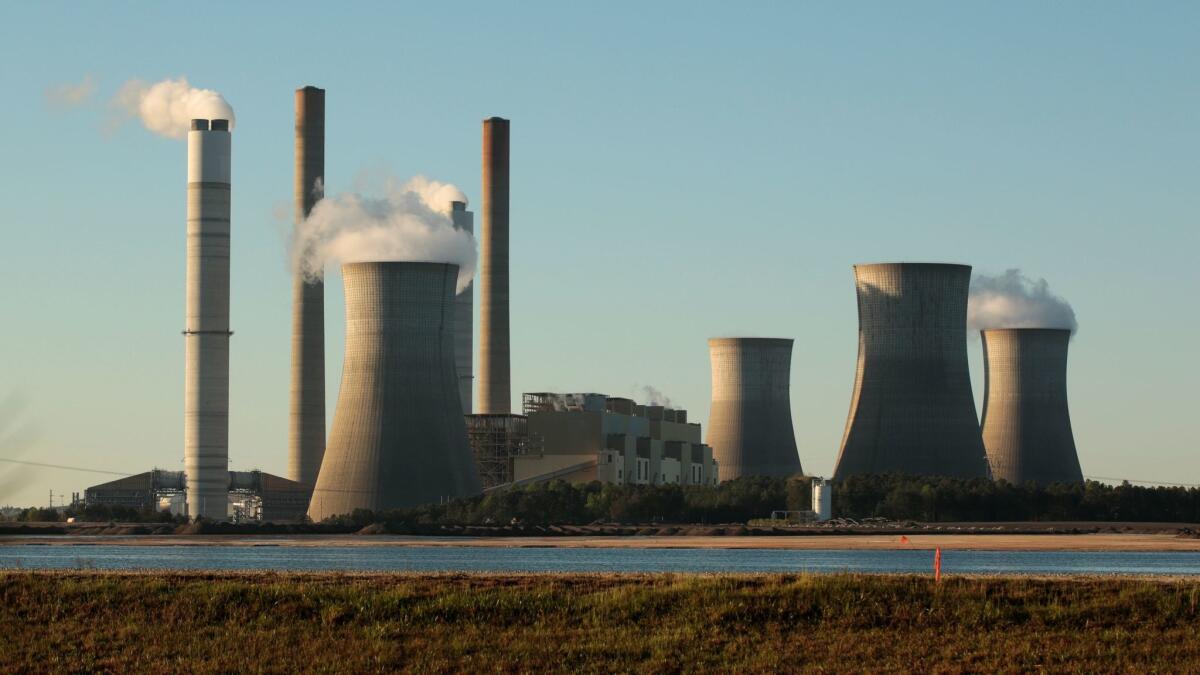Review: ‘Frontline’ looks at whether ‘War on the EPA’ is a triumph or a tragedy

If you should care to spend an hour Wednesday night contemplating the fate of environmental regulation under the current presidential administration, the PBS series “Frontline” has a documentary for you, “War on the EPA.” The title plays off right-wing slogans that imagine a government-waged “war on coal,” or a “war on Christmas.” (“My administration is putting an end to the war on coal,” we see Donald Trump say.) But this war is real, and the evidence, advanced with pride or dread by each side, is here.
Specifically the hour sets out to answer the question “What is Scott Pruitt doing running the EPA?” As Oklahoma state attorney general and a key member of the activist Republican Attorneys General Assn. (RAGA), Pruitt sued the Environmental Protection Agency more than a dozen times. As that agency’s head, his main interest seems to be ridding the regulatory agency of regulations — “making the regulated the regulators,” in the words of New York Times reporter Eric Lipton, whose Pulitzer Prize-winning work is one of the pillars upon which “War on the EPA” rests.
Not surprisingly, the answers are to be found at the intersection of conservative ideology and industrial self-protection, with money from the latter fueling the former. Lipton recalls a RAGA fundraiser (he “was never asked who I was or why I was there”) where “lobbyists were writing checks right in front of me and handing checks to attorneys general and to their aides.” Controversial coal magnate Bob Murray, who calls climate change “a theology,” is happy to note that he has Trump’s ear (though he answers “No comment” when asked if he had anything to do with the choice of Pruitt to run the EPA).
Although some extreme personalities, like Murray, resist normalizing, “Frontline” does a good job of presenting its interview subjects — think tankers, reporters, politicians, industrialists, bureaucrats — as rational and sane, whatever their viewpoints. (Pruitt did not consent to be interviewed.) This is responsible journalism, and, one might say, confusing in a good way, as you are forced to consider well-spoken speakers offering contradictory claims with similar confidence.
As with most documentary films, the really interested viewer will finish the hour with additional questions. Some recent Pruitt-related newsworthy oddities — including his taxpayer-funded use of non-commercial and military flights, the $25,000 soundproof booth he had built in his office and his expanded security detail —were not in the episode, at least as it was available to screen two days before airing.
Some points are made only fleetingly — for example, that the fortunes of the coal industry and coal miners have been determined more by automation and competition from natural gas than any dicta out of Washington. That global warming is real is not, for a thousandth time, explained, but man-made climate change is probably not something of which most “Frontline” viewers need to be convinced. Nevertheless, the tone is equitable enough that one could plausibly read “War on the EPA” as a tale of triumph or tragedy.
Still tragedy seems pretty clearly what the narrative intends, as the hour concludes in a montage of cuts, rollbacks, replacements and withdrawals.
“What everyone is trying desperately to do,” says Betsy Southerland, the former director of science and technology in the EPA’s Office of Water and a 30-year veteran of the agency, “is to hope against hope that their facts will change Scott Pruitt’s mind, that they’ll be special and they’ll be able to convince the administrator not to go with whatever the industry people have asked him to do and to give some deference to the science and the engineering behind previous regulations that were so thoroughly thought-out and so thoroughly justified.”
This all reflects a larger argument, if you want to call it that, between local short-term interests (profits, jobs) and global, long-term ones (the health of the planet and its people). Some commentators here, whether out of political convenience or genuine belief, frame it as a culture war, the coastal elites imposing their will on the people of the heartland. But it’s useful to remember that the EPA was formed in the Nixon administration, when there was broad bipartisan and public support for tackling pollution. There is room to meet in the middle, of course, when there is the will to.
Follow Robert Lloyd on Twitter @LATimesTVLloyd
ALSO
‘Frontline: Iraq Uncovered’ captures the extreme fallout of a country divided
More to Read
The complete guide to home viewing
Get Screen Gab for everything about the TV shows and streaming movies everyone’s talking about.
You may occasionally receive promotional content from the Los Angeles Times.







